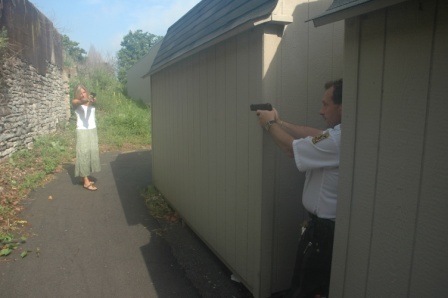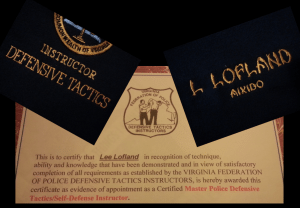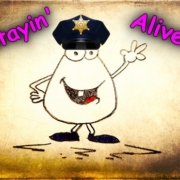20 Survival Tips for Real and Fictional Officers
Cops absorb lots of information during the months they spend in the training academy. Then, when they finally do hit the streets they’re required to ride with a field training officer for a few months, a time when the FTO crams even more important stuff into their brains, all while responding to crimes and complaints in real time.
Over and over again, academy trainers and field training officers drill information and practical skills into the minds of recruits. Over and over and over again. And then again.
And, among all the laws, facts, figures, running, pushups, sit-ups, shooting drills, defensive tactics, and on-the-job training, a common theme emerges—officer survival.
Here are a few tips to help keep officers safe
1. Remember these three words. You will survive! Never give up no matter how many times you’ve been shot, stabbed, or battered.
2. Carry a good weapon. You can’t win a gun fight if your weapon won’t fire.
3. Carry plenty of ammunition. There’s no such thing as having too many bullets.
4. Treat every situation as a potential ambush. This includes during meals, at movies, ball games, and church, etc. You never know when or where it could happen. This is why cops don’t like to sit with their backs to a door. Please don’t ask them to do so.
5. Practice your shooting skills in every possible situation—at night, lying down, with your weak hand, etc.
6, Wear your seat belt.
7. Wear your body armor.
8. Always expect the unexpected.
9. Suspect everyone until you’re absolutely sure they’re okay and pose no threat to you.
10. Trust no one until trust is earned. Even then, be cautious.
11. Everyone is a potential threat until it’s proven they’re not. Remember, bad people can have attractive faces and warm smiles and say nice things. But all that can change in the blink of an eye.

12. Know when to retreat.
13. Stay in shape! Eat healthy. Exercise.
14. Train, train, and train.
15. Take advantage of specialized training classes and workshops outside of the department police academy. For example, the blackbelt trainers at your local gym just might be police academy or military instructors who could address your concerns and weaknesses, and/or enhance your strengths. For example, some of the specialized training I’ve taught include standing, prone, and ground combat, knife and stick fighting, defending against the sudden attack, and personal and executive bodyguard training.
16. Use common sense and remember your training, because your family needs you safely at home at the end of your shift.
17. Family first. Job second.
18. Make no judgements based on a person’s lifestyle, personality, politics, race, or religion. Treat everyone fairly and equally, from the homeless drug addict to the crooked Wall Street embezzler. However, remain on alert and cautious at all times.
19. Talk to people. Get to know them. Let them get to know you. After all, it’s often a bit tougher to hurt an officer they know and trust.
20. Find a release for your stress. Bike/exercise. Vacation. Talk to someone. Read. Write. Spiritual guidance. Hobbies.
Seek help the moment you notice a change/decrease in your work performance, increase in anxiety, excess use of alcohol and/or you consider drug use, change in sleep habits, you experience suicidal thoughts, or other drastic changes in your normal behavior.







What a great list! Thanks, Lee! How do police academies screen for someones mental toughness and psychological readiness for being a cop? I’d love to learn about that! Thanks again for all the useful tips!